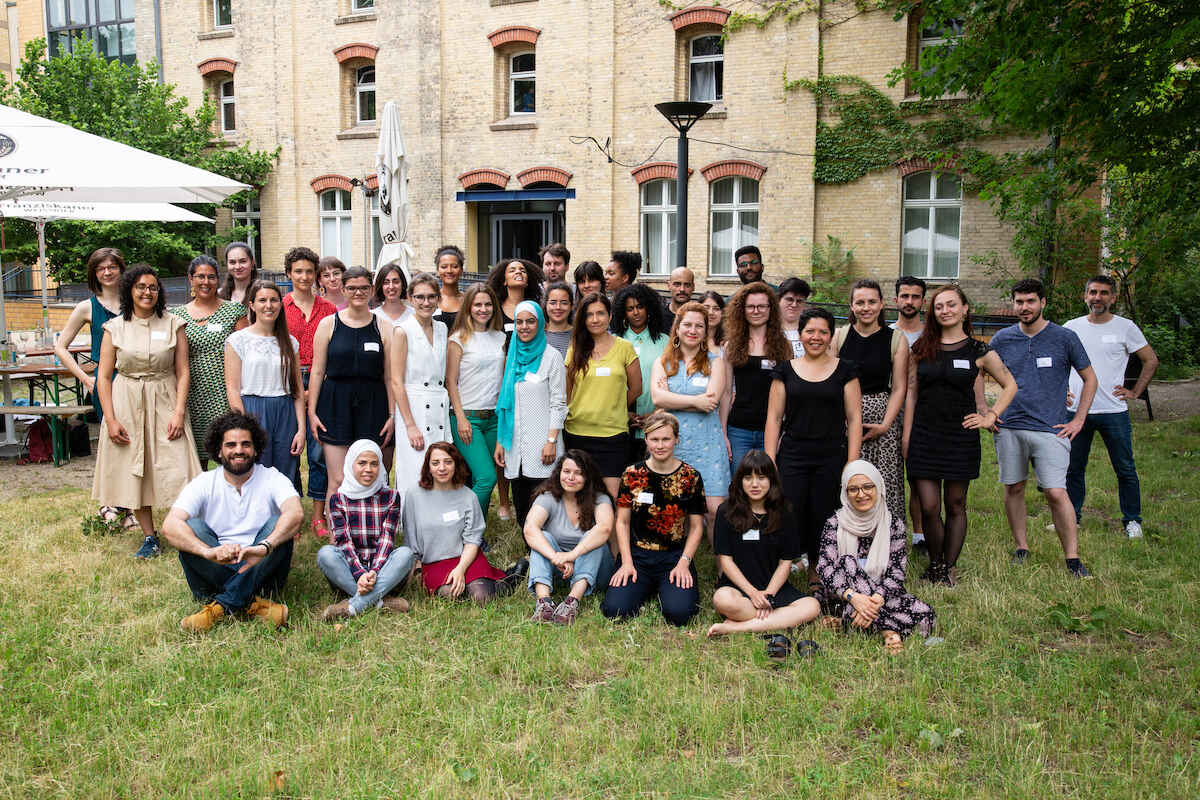
Photo: Körber-Stiftung
Exile journalism in Germany
Exile journalism in Germany.
Current challenges and initiatives at a glance.
When people are persecuted because of their political views, religion or ethnicity, their life may be under threat, and they often have no choice but to go into exile. However, when they do so, they leave behind their home country, their social environment, the language they grew up with, and their opportunities for professional development. These consequences are particularly significant for journalists who are targeted by threats and violence. When they finally arrive in exile, they usually have no access to their most important tools: the language of their home country and their network of contacts.
During his ‘Speech on Exile’, which was held in Hamburg last October, Can Dündar, an exiled journalist who now lives in Germany, underscored the extraordinary situation faced by many exiled journalists when he stated: ‘Where I write, is Turkey’. Exiled journalists live and work between two countries and cultures. In many cases, they address their compatriots in their home country, but still need to continue working and building a life in their host country – and to do so from scratch.

People with a background in publishing
What are exiled journalists and how many are there?
Terminology
Germany is undoubtedly an important country of exile, not just for journalists. Persecuted authors, scientists and artists from all over the world find refuge in Germany. Germany’s constitution not only guarantees freedom of speech, writing and pictures (Article 5), but also the right of asylum (Article 16). However, it is not even remotely clear how many exiles live in the country. Nobody collects data about them; not even the authorities. Neither the federal government nor the Federal Office for Migration and Refugees has reliable data about the number of exiled journalists living in Germany. Occupational data is simply not collected for anyone arriving in Germany seeking asylum.
Collecting data such as this would be very difficult. In Germany, ‘journalist’ is not a regulated profession. The Internet Era – a time in which anyone with an internet connection can publish throughout the world – has blurred the definition of the term. Should a YouTuber who occasionally talks about political issues but who has never worked in the formal media sector be considered a journalist? Is a student who writes for a student newspaper during their free time also a journalist? And should a person who worked as a journalist in their home country be considered an exiled journalist if they now work as a bus driver in their host country?
The nuances at play in this regard certainly have an impact on the public’s perception of terms such as these. An ‘exiled journalist’ tends to be met with a more positive reception than a ‘refugee’ or an ‘asylum seeker’. The term ‘exiled journalist’ conjures up imagery of research, resistance and the fight against political persecution. It reminds us of Kurt Tucholsky, Egon Erwin Kisch and Edward Snowden. Rebecca Roth from Neue Deutsche Medienmacher, an association that helps integrate migrant journalists, stresses that many refugee journalists point out that they are journalists, not just refugees. But does someone who was forced to leave Turkey for posting on Facebook also count as an exiled journalist?
Whatever the case, this term undoubtedly applies to Can Dündar. In Turkey, Dündar’s home country, he was editor-in-chief of the newspaper Cumhuriyet. However, he was arrested for political reasons and was even the target of an assassination attempt. Dozens of journalists from other countries in which freedom of the press is suppressed have also suffered similar fates. If they return to their home country, they too will have to fear for their freedom, if not their life. These individuals are clearly exiled journalists.
However, many cases are more complicated than this. The reasons why people are forced to leave their country are rarely one dimensional. Although there are some journalists among the many migrants who have arrived in Germany since 2015, not all of them were politically persecuted in their home country. They came to Germany to escape war and misery, which are certainly valid reasons to do so, but does that mean they should be referred to as exiled journalists?
‘Gesicht Zeigen’, an association based in Berlin, has established a coworking space in the city. The association refers to refugees involved in the media as ‘people with a background in publishing’ to avoid terms such as ‘refugee’ and ‘migrant’, which contribute to stigmatisation. The question remains whether exiled journalist would be the more appropriate term or if a certain vagueness is unavoidable in this context.
The scale of exile journalism in Germany
All experts agree that the number of exiled journalists living in Germany has risen rather than fallen in recent years. The reasons are quite clear. First, the overall situation concerning the freedom of the press has deteriorated throughout the world, as the international organisation Reporters Without Borders points out in its latest annual report. The murder of Saudi Arabian exiled journalist Jamal Khashoggi has recently led to a greater focus on this issue. Second, more and more people have been displaced worldwide. The United Nations estimated that there were 70.8 million refugees at the end of 2018, a much larger number than in previous years.
Reporters Without Borders stresses that several dozen journalists are forced to leave their home country every year.
Jens-Uwe Thomas, who is responsible for emergency aid and refugees at Reporters Without Borders, describes Germany as one the main destination countries for these individuals. The organisation has assisted 650 exiled journalists throughout the world since its inception. The New York NGO Committee to Protect Journalists (CPJ) has provided support to a similar number. Between 2010 and 2015, CPJ knew of 452 journalists who had been forced into exile.
The countries of origin
There are no precise statistics on the countries from which exiled journalists come. However, reports by the organisations that assist them yield some information. Figures demonstrate that exiled journalists living in Germany typically come from Turkey, Iran and the North African Maghreb states. Why do journalists from these countries in particular seek refuge in Germany? The German-Turkish journalist Ömer Erzeren, who is well-connected with exiles in Germany, explains that Germany is a popular country of exile for Turkish journalists because many people of Turkish origin already live here. This makes it easier to get in touch with other Turkish journalists in Germany.
Jens-Uwe Thomas from Reporters Without Borders also notes that Turkish journalists are attracted to Germany because of its large Turkish community.
Thomas also underscores the importance of language in a person’s choice of a country of exile when he argues that it is relatively easy for Turkish speakers to find their way around in Germany even without being able to speak German. Martina Bäurle, executive manager of the Hamburg Foundation for Politically Persecuted People, which provides scholarships to journalists who are seeking protection, points out that her organisation receives relatively few applications from Latin America, not because freedom of the press is necessarily stronger there, but because of language issues; colleagues from these countries tend to seek refuge in Spanish-speaking countries or in the US.
The number of exiled journalists from the typical countries of origin has been far exceeded by those from Syria, Iraq and Afghanistan for several years now.
Thomas confirms this: ‘Since 2014/2015, almost half of the people seeking help from us have come from Syria’. While all of these countries are also ranked low on the Press Freedom Index, with journalists certainly subject to persecution there, the civil war is probably the main factor driving Syrian journalists, for example, out of their home country. As a result, non-political and even regime-loyal journalists from Syria have sought refuge in Germany as well.
In addition to the main countries of origin, journalists in need of protection tend to come to Germany from Azerbaijan, Uzbekistan, Cuba, China, Uganda, Vietnam, Bangladesh, the Maldives, Eritrea, Sudan as well as many other individual states. In recent years, journalists from European countries such as Hungary, Poland, Macedonia and Ukraine have also once again begun seeking exile in Germany.

Impressions of the report 


Ten ways of improving the situation of journalists in exile
10 pulses
- The reasons that force people to leave their homes are very different, and the same can be said of the fate of journalists in exile. Some individuals remain focused on their home country, whereas others prepare for permanent residency in Germany. As such, it is important to promote career advancement in two ways: some exiles need help integrating into the German media market, whereas others need assistance in preparing for their return home.
- Language is the biggest obstacle to integration into German society and media. General language courses for refugees should be supplemented by specialist courses aimed at people from the media.
- Exile media usually have difficulties securing financing. However, direct funding by the state jeopardises neutrality. As such, projects should be funded indirectly or by non-governmental organisations.
- Linguistic and cultural barriers mean that it is almost impossible for refugee journalists to find internships. These barriers could be removed by providing specialist internships that take the particular needs of refugees into account.
- In addition to internships, basic courses on journalism in Germany could also be helpful. They would need to cover issues such as: How is the press structured? How do German editorial offices work? What sources exist for pictures?
- Refugees living in Germany need more media in their native languages. Establishing new services could also create jobs for exiled journalists.
- Publishers and editors provide very little longterm support to exiled journalists. However, it is important that they become more involved in the long term, particularly in training. This would also be beneficial to publishers and editors as it would increase diversity, provide access to new networks and enable reports to be written from a different angle.
- Hardly any refugee journalists find permanent jobs – most are freelancers. Freelancers need advice about issues such as how to draw up invoices and about tax. Advice services could also help them to prepare CVs, to translate articles and to write job applications.
- Translations are very common in literature but not in journalism. Translations would enable refugee journalists to publish their own articles in the German media. As editors are reluctant to spend money on translation, this could be funded by non-commercial entities, such as a translation fund.
- Networking between exiled journalists has been sporadic until now. Existing conferences and formats for discussion aimed at journalists could be used to facilitate exchange between exile media.


